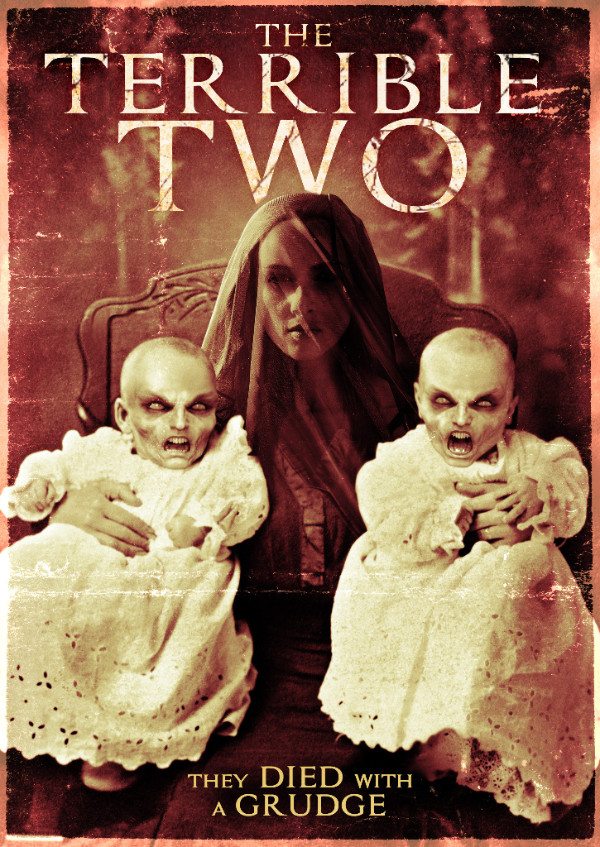The Terrible Two
March 2018
Writer/Director: Billy Lewis
Starring: Cari Moskow, Reid Doyle, Donny Boaz
Reviewed by: Sean Leonard
The Terrible Two is the latest film by writer/director Billy Lewis, though not his first foray into the realm of horror – his debut feature, 2009’s The Jailhouse, dipped into claustrophobic territory with a family feeling unwelcome in their own home. Nine years later, Lewis returns to similar territory with a creepy tale of a couple struggling to get by after their two daughters die in a tragic accident. And much like in his debut film, the horrors that befall our protagonists in The Terrible Two have everything to do with location, location, location.
This story is about the Poe family, specifically Albert and Rose Poe, a husband and wife who lost their two young daughters one year prior. Lewis sets the story on the one-year anniversary of the girls’ deaths, and leaves the past to be shown mostly in flashbacks, which increases the mystery surrounding the unfortunate events. It’s been a very difficult year for them – it doesn’t help the grieving process that the day they died also happened to be their birthday – but recently things have been becoming more unsettling around the house. Rose seems to be hearing her daughters’ voices and begins talking to them. Then she stumbles upon an old manuscript in the attic, “Chasing Legion,” which appears to have been written by a previous owner of the home and details some kind of demonic possession. When the family doctor comes by to check on her, he is overwhelmed by a feeling of evil and must leave. While Albert gets more and more frustrated and contemplates selling the house, Rose investigates this mysterious author and learns of horrible things that had previously happened at their house…also involving the deaths of two little girls. There just might be something going on with this house that they once considered their dream home, but by the time they come to this conclusion, it might be too late.
Lewis does a good job setting up a creepy story, creating the appropriate atmosphere in which to tell the story, and then building up to a climax slowly, pacing out the scares in a way that keeps his audience on their toes. There are some well-placed misleading details that have us looking one way before discovering that we should have been looking the other. At times, the chills come in the form of something moving quietly in the shadows or the background, with moments reminiscent of The Strangers and Inside, while a handful of jump scares are sprinkled in to increase the overall paranoia. The building tension in Albert and Rose’s relationship as husband and wife adds a nice outer coat to the uncomfortable motif. While the overall story is good, some of the dialogue is a little shaky, but it’s hard to tell if the blame falls on the writing or the delivery.
Where The Terrible Two occasionally falls in a rut is in the acting. Donny Boaz (Dallas reboot) plays his minor role of Fred the realtor just fine, as does Devin McGee (from TV’s One Tree Hill) in the role of Dr. Connor. The standout performance of the film belongs to Cari Moskow as Rose Poe, who has a very Lorelai Gilmore look to her (which certainly doesn’t hurt things). She brings an appropriately emotional edge to the grieving, disturbed mother when necessary, and manages to crank up the crazy just right in the later half of the film. The most memorable scenes tend to center around her and feature her prominently (and some step too much into spoiler territory to get into here). Unfortunately, Reid Doyle’s turn as Albert Poe falls quite flat and emotionless, which definitely hurts seeing as he is one of the two major characters in the film. This ends up creating a feeling of imbalance throughout much of the film, which distracts a bit from some of the creepier moments.
Billy Lewis has a well-made haunted house/ghost story/possession thriller in The Terrible Two. The film delivers a fairly original tale with some familiar aspects (think along the lines of The Amityville Horror and the like), and it succeeds it setting a tone and sticking to it. Lewis does not rely on over the top gore to cover up an otherwise weak story, but instead put together a pretty creepy tale that ends up light on the bloodshed. Most criticism falls on either the acting (as discussed previously) or on the CGI effects, both of which have nothing to do with the story itself and could be helped with a budget boost. If he continues in this direction, it’ll be interesting to see what the future brings for Lewis as a filmmaker.









